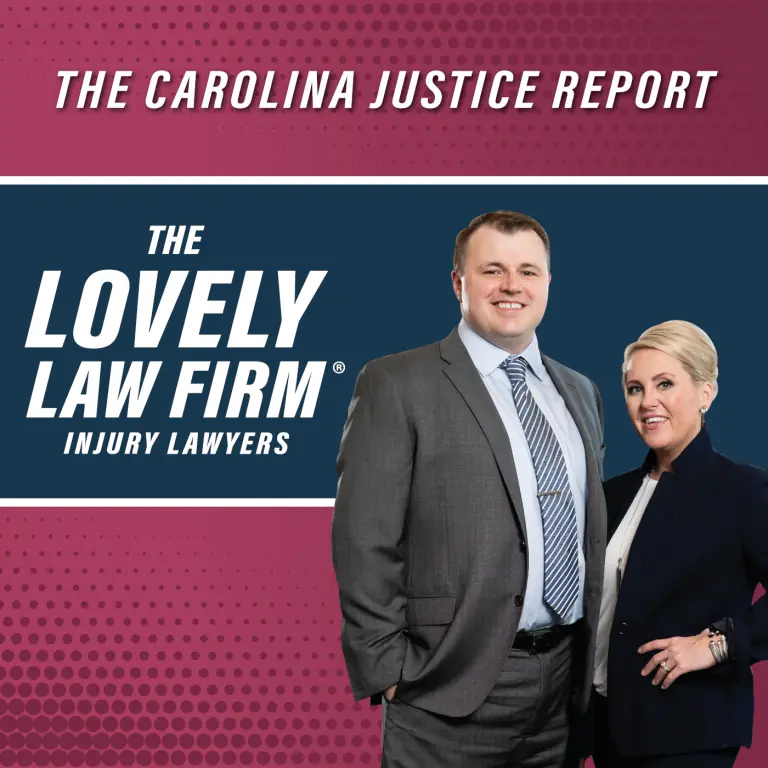The New Hampshire Jarhead MC tragedy is one of the most horrific accidents to ever occur in the biker community. The victims were injured not only by the accident itself, but by the negligence of both a trucking company and the department of motor vehicles. Patrick Anderson of the National Academy of Motorcycle Injury Lawyers interviews Justin Lovely to discuss this case and what would happen if this occurred in South Carolina.
Justin’s #1 tip for riders in South Carolina

If you or a loved one rides, make sure you are protected. If you want to discuss any motorcycle related issue please give Justin a call at 843-839-4111 or email him directly at [email protected]
[PODCAST TRANSCRIPT] If you prefer to Read!
Patrick Anderson: Hey! This is Patrick Anderson. I’m your host and I’ve received several questions from our listeners about this horrific motorcycle wreck in New Hampshire. So, for the benefit of our listeners, I’ve asked Attorney Justin Lovely to do an interview. Now, Justin is the President of the National Academy of Motorcycle Injury Lawyers and he’s also one of the founding members. Justin, on our break, you were sharing so many legal aspects of this terrible tragedy with me that I almost don’t know where to begin but the main question I have for you and the main question probably on everybody’s minds is how would you go back getting justice for these riders and their families if this accident had happened in South Carolina?
Attorney Justin Lovely: Yeah. Patrick, thanks for having me on but what a nightmare scenario that this was and as it continues to be for these families. You know, it’d be hard. You have to take it all in. But in South Carolina, I mean, the first thing you got to do is just you’ve got to do your own investigation. If something like this happens, we have to figure out who are the parties that we’re going to go after. Are we going to go after the at-fault driver? Are we going to go after the owner of the truck? If there’s an owner-operator scenario, maybe there’s a different insurance policy with the lease scenario to go after but the injured parties have underinsured coverage. It’s their personal injury protection coverage or med pay policies that we could recover for their families. A lot of different scenarios to take in and get started with a case like this, but the first thing you definitely got to do is get our own team of investigators because, at the time, it was pure chaos out there in New Hampshire.
Patrick: When you say investigators, what kind of investigators do you have?
Justin: Well, in my office I do have two investigators. One is a retired detective from Raleigh, North Carolina. He is my primary investigator. I use him for everything. Real good guy. He rides. He was injured in the line of duty so he couldn’t be a detective anymore. So, he’s kind of retired down here in South Carolina. That’s why he got to work for me. My second guy is a badass investigator. He is a retired Special Forces but they still call him up to do some duties and he’ll leave and disappear for a few months and that we kind of know he is doing something for the country but when I need him, he usually can show up and he gets the job enforced.
Patrick: Now, there’s really two kinds of issues here. Obviously, several people were murdered. They died and so you’ll be working with their families. Then the rest of the folks, I mean their injuries are just beyond horrific. There mounting to– the last report I read was like over a half-million dollars for just one of these people. So, let’s talk about that first. What would you do for the people who got hurt in the accident? You know, dealing with medical bills covered and all that kind of thing.
Justin: Yeah so the first thing we do, of course, I just said it not to beat a bush but you have to investigate the claim. We got to figure out who are we going to attack, what sources of recovery is there to get. Like you said, we got to distinguish there from potential wrongful death case if the person has mounting medical bill but they, fortunately, lived through the accident. What we do is we set up the claims, figure out who we’re going after, hopefully, their medical bills– They have health insurance, hopefully. We have stopped and called the Collateral Source Rule in South Carolina. What that means is if there’s health insurance, fix up their bills, and pay the contract in price. I can still get to submit what I got to try to fill with the pays or negotiate for them their full value of their medical damages so they’re getting the benefit of their health insurance’s contract at price out of different providers whether that’s ambulance or the E.R. or he has physical therapy or something in exigence whoever it may be. We let them treat– We handle all the medical, get the medical bill then handle with their liaison with the insurance companies. Really just build their case up to move forward with it. Make sure they get the medical treatment that they need and go ahead and file the lawsuits if we have to. If we know it’s a similar case like what happened to New Hampshire and South Carolina, of course, you want to go ahead and get it filed. This is a potentially devastating case to that carrier because they’re going to have seven awful deaths, they’re going to have the families, they’re going to have the three that were hurt, they’re going to have their mounting medical bills. You would really want to get the case in suit as quickly as possible.
Patrick: Since we’re talking about the wrongful death cases, that’s different. A lot of the same things apply as for as finding out who’s at fault in the insurance but what are the other particular things for families? I mean they’re dealing with burying their loved ones and everything else. How do you work for them separately?
Justin: Yeah and again, it is separate. A lot of it is the same but we’re not dealing with any kind of treatment scenarios. The South Carolina created a specific calls of action for wrongful death. It’s South Carolina Code 15-51-10 and that statute allows a wrongful death claim to proceed whenever there is a wrongful act, neglect, or default of an at-fault party. They can go for any kind of case, for trucking case, a motorcycle case, a court case, anything. But a wrongful death statute allows for us to bring an action on behalf of the spouse, on behalf of the children. If there wasn’t a spouse or children, we can bring it on behalf of the person’s parents or of course if there are no parents, spouse, or children, any kind of heirs. We kind of research that. We kind of figured out who’s going to take under the potential wrongful death case. Those kinds of damages that we’re going after, you know we’re going after the medical bills from the deceased’s treatment, any kind of funeral costs, the loss of funds or support or benefits, loss of household services, loss of companionship, those kinds of things. Now, going along with that, there is another aspect that’s called a survival action. A lot of times, we have both and under our act in our law in South Carolina, I’m sure this is just like that in New Hampshire. They have a similar statute but in South Carolina, we would also bring a survival action like I said and that is seeking damages if there was any kind of suffering prior to the death. So, if they were hit on the scene, basically we’re saying they survived the initial accident but the injuries and damages were enough that they succumb to it eventually. So, think of the scenario, we would file those claims, we’d meet with all the interested family members to learn the circumstances of the loss, explain what we can do, gather as much evidence as possible, police report, accident report, witness statements, medical records, bills. Again, at that point in time, we’ve already identified the responsible parties and the sources of income, calculate the damages, develop the best legal strategy that we can, negotiate on their behalf, and just try to get them an appropriate settlement with both the wrongful death case and the survival action.
Patrick: Now, speaking of who’s at fault, that was another thing that came up as people are asking me questions about this. So, on one hand, you got the driver, a 23-year-old driver who has a crazy criminal background with theft and break-ins and he’s got driving under the influence of a crack pipe. I mean, I don’t even know why he would have a commercial driver’s license in the first place, but then he got suspended in Connecticut and he goes down to New Hampshire to start driving with another trucking company. So, possibly, the trucking company also has some responsibility. I can’t imagine that they did a proper background check and then decide to hire this guy.
Justin: That attorney in New Hampshire is going to have a field day with this. The federal regulations outlined the carrier’s responsibility to obtain their background information of the driver before they hire him in. There is definitely negligent hiring component to this and even if this happened in South Carolina, we would still bring negligent hiring because these are based under the federal regulations for truck drivers. Absolute nightmare. The trucking company does not investigate their qualifications of this potential driver. They’re deemed to have actual knowledge, not just– They can’t just say, “I didn’t know this”. If they don’t act to actually investigate these people they’re hiring, they’re deemed to have actual knowledge. So, taking to account if a joker like this guy in New Hampshire was down here in South Carolina, they’re supposed to lose their license for 60 days if you have a conviction within a 3-year period and this is talking on like a minor scale. If he even has a speeding ticket. If you’re going 50 miles over a speeding ticket, you have a reckless driving, and improper lane change can make him lose it for 60 days. Following the vehicle too closely, any other motor vehicle traffic or texting and driving or driving without a license. Now, similar to this New Hampshire guy, you’re supposed to be disqualified for a minimum of a year under the federal guides. If you got a DUI, he had operating under an influence charge prior to this, a record something similar to that.
So, yeah, and the trucking company has to know that and they have a duty to investigate their driver’s driving experience and their qualifications. Now, some jurisdictions will say, well, they have to do their driving record and know their driving record and investigate their driving record but maybe not their entire criminal background. Between me and you, that’s absolute bullshit. They need to investigate the whole thing. A lot of times, when we have this kind of case, we start investigating and it definitely comes up that there was a failure or a breach in their system of investigating these people prior to hiring. That takes you to another point, Patrick, and this might get a little offtopic but I’ve heard this from the industry because we do these trucking cases and we do motorcycle cases. I’ve heard that this trucking company is, due to the economy, is just having such a hard time hiring people. That’s the rise with Uber and they’re trying to get this self-driving car or self-driving trucks. The cars of this trucking company are having a problem hiring qualified drivers. That may come into a place that this lawyer also up in New Hampshire might discover, hey, they couldn’t hire anybody so they just said, to hell with our duty to investigate these people. We don’t want to know. We just want a driver on the road and of course, it’s going to bite them in the ass when it [inaudible] them.
Patrick: Well, yeah, absolutely. Now, here’s another angle to this. Maybe you can comment on it but evidently, the flatbed trucking trailer that a guy was driving like 2, 3 weeks before, it also flipped in, right? Nobody was hurt so the police didn’t issue any citations and such, but if there were some failure to maintain that trucking trailer or if there were something else having to do with the manufacture, would that contribute to the accident and cause another party that you could sue on behalf of the victims?
Justin: Yeah. Again sometimes, we have these cases where a lot of us will see is–. You’ll see a car roll off. That’s what makes it flip but they have a duty to look out for the mechanical failures and sometimes we can bring a call of action for negligent inspection, negligent maintenance, negligent repair, and yet a motor carrier can be held responsible for any injury caused by failure to properly inspect, maintain, or repair the equipment. That’s controlling. So, like you said, maybe the brakes don’t work or something should have been or did not be found on a free trip inspection. Definitely, that would subject them to a claim for negligent inspection.
Patrick: It seems like that might be something to definitely look into. You remember a while back with Tracy Morgan and Walmart truck driver, we had a lot of questions about that case came up as well. One of the things that were so interesting to me was Walmart came out right away and said, we’re going to take care of all the people injured. There’s like 3, 4 vehicles involved, several people but then when it finally came down to the point of their attorneys actually looking at things, the attorney said, no, we don’t have any liability. There is contributory negligence on behalf of Tracy Morgan and other folks because they weren’t wearing a seatbelt. Eventually, they were saying the whole accident was their fault because they didn’t wear a seatbelt. How would you handle things like that? When they come back and try to pinpoint it on you, there has been cars or partial cars, how do you deal with that?
Justin: We see that a lot with motorcycle accidents especially. They always try to pin it on the biker or the rider. It’s ridiculous but it’s something we have to overcome. Here’s what I tell my clients. Remember they’re going to bring that up but luckily in South Carolina, we’re not as harsh as some states. In North Carolina, they have a pure contributory negligence set of laws where if you’re 1% at fault, you can lose your whole recovery. Luckily, in South Carolina, they would have to prove that the interparty or the victim is more than 50% so as long as we’re not more than 50% at fault, we would still have a claim. Then what happens is, after just trying– Similar to Tracy Morgan, what we’ll try to do is they– we’ll, hey, arbitrarily, we’re going to say that the biker was 20% at fault. And we have to fight that fact all the time. Basically, we’re just going to hold our stick to the fire, say under what grounds or you coming up with arbitrary number and a lot of times it’s the adjuster. We call it adjuster law in the office here because he’s not going by any kind of scientific standards or what’s on the medical records or what’s in the accident report, or what our experts’ report. He’s just making up his own mind. We go so far in miles because I turn them into the South Carolina Department of Insurance, that’ll put up with it. If they start their arbitrary stuff with my clients, immediately, we get to ask him to correct it politely, deal with a specific timeline and if not then we either file the lawsuit along with the Department of Insurance complaint against the adjuster or we’ll go ahead and file the Department of Insurance complaint with that sorts of file to give us some leverage in the lawsuit.
Patrick: So, you know a lot of these games that they play and it’s really just a matter of what negotiating and getting leverage on them and pointing out what you’re going to do if you go to court? Is that how that works?
Justin: Yeah, and Patrick, it shouldn’t be like that. It should be– because a lot of these are cut and dry but they are trying to save money for their shareholders, policyholders, whoever it may be. The only way they make money is denying the late claims. It’s ridiculous, especially for the hurt person. But yeah, it’s a game they play and we just got to do hold the stick to the fire and do what’s right by my client.
Patrick: This is like a crazy part of this case and I’m sure it doesn’t come up that often, shouldn’t come up that often, but then the RMV had gotten notification both through electronic means and then also received a pre-note that this driver’s license should have been resented or canceled or whatever. Because of their lax way of handling things over the last year, they’ve got thousands now of cases that should have been terminated but they’re not. So, the government [inaudible] came out and said that he is calling on a full investigation, the head of the RMV resigned. Is there some liability on the part of the state or the RMV in this?
Justin: Based on the statute, what I’ve been reading up there, and of course I don’t really know the New Hampshire law but I would say yes. That is, like what you said, it’s crazy. That’s the most bizarre thing I’ve heard in a long time. If that happened here in South Carolina, I would love that case. I would bring that case all day long. I haven’t heard of a similar set of facts but one thing a little different here in South Carolina is our Tort Claims Caps. Unfortunately, in South Carolina, no matter what a public entity does, we are limited to a $300,000 recovery. Now, there is some talk in the legislature to increase that coming up but right now, even if we would have proved the exact same set of facts to the New Hampshire case, our only recovery for these injured and deceased marines will be the 300,000 caps. But that’s some creative lawyering of the New Hampshire. He’s calling them accountable and it’s bringing light to this bigger issue. A scary issue that we have, like what you said, hundreds of these other commercial drivers on the road out there. It’s crazy so it’s like a ticking time bomb it can happen again.
Patrick: Yeah, and since it looks like there’re so many things here that are just absolutely wrong, should not have happened that contributed to this, what’s the potential for punitive damages?
Justin: For punitive damage, you have to prove in South Carolina, at least, willful, wanton, gross negligent, reckless conduct. These cases are written all over it. Those damages are above and beyond your regular damages. They’re meant to punish behavior. Everything about this is bad. Again, with the DMV/RMV issues, you’ll be limited to the Tort Claims Caps but as far as the carrier, as far as the at-fault driver himself, as far as any other entity or insurance company that’s insuring those entities and underinsured coverage, they would be responsible for potential punitive damages for sure.
Patrick: Now, we’re talking about insurance and you mentioned that a couple of times but if you didn’t have underinsured motors coverage and this happened, you’d become screwed, right?
Justin: I preach that to my clients. I preach that to whoever wants to listen to me. I go to motorcycle clubs. I go to bike weeks. I go to Harley Davidson. I go to our local riding club meetups, everything. I tell everybody, get your UIM, Underinsured Motorist Coverage as high as you can afford. It’s not that much more expensive when you really think about it. You don’t have to do it for yourself. Do it for your spouse, do it for your kids because like what we’re talking, if at the at-fault driver only have a minimum policy and in South Carolina, that’s a $25,000 policy. Your emergency room bill is going to be more than 25,000. Easy. So there goes that first part. You can’t count on him to have million-dollar insurance. It’s more than likely you’re going to have that minimum policy. So the only thing you can do is to up your underinsured coverage and work you underinsurance with the first party policy and they will step into the shoes of the at-fault driver up to your policy limits that you purchased. In South Carolina, locally, sometimes we can stack policies. What I mean by that is if you have more vehicles at home, sometimes I can pull back and you may think you only have a hundred thousand in coverage but you have three vehicles at home, well guess what, now you have 400,000 in coverage that we can get you and your family, your kids when you fall, when you’re hit. That’s always an avenue. I always preach that. You can never count on the at-fault driver. You got to increase your UIM coverage. Another thing that’s underlooked is your PIP or your MedPay Policy and that coverage kicks in whether you’re at fault or not. It’s Personal Injury Protection or MedPay. In South Carolina, I always recommend if you have health insurance, get that the bigger help whatever your health insurance deductible is because you’re more likely to be in a motor accident and get hurt in which your PIP cover your health insurance and your health insurance will cover your meds. You’re not out to pocket anything and we’re able to fight for you and get you a recovery.
Patrick: I know. While you’re talking, I was totally surprised. I thought I want to talk to my insurance agent then I’d say I want a full coverage policy. As I’m talking to you, I realized I’m not really insured properly at all.
Justin: An insurance company [inaudible] the insurance and a lot of times he’ll make me call and you’ll say exactly what you just said. I need a full coverage policy. I need the cheapest policy. Those are the two words I hear the most common in my practice. Well, cheapest they’re just going to give me the liability. That’s it. That covers absolutely nothing. Full coverage, now, they’ll probably give you comprehensive coverage that will cover if you drop your bike or something stupid like that, but that’s not underinsured motorist coverage. In South Carolina, they have to make you a meaningful offer of UIM and you have to specifically by a signature decline that coverage. There’s times where clients come into me, they’ll say, “I don’t have UIM”. We’re able to do an investigation, request those actual documents from their first-party insurer. They can’t provide it. Then I’ll be able to do what we call reformation of the policy. Do we fall them to give them some UIM coverage. We see that a lot of malpractice unfortunately but the best course of action is to make sure you have your UIM. I do that, Patrick, for my clients. I do it for anybody. Just call me, come by my office if I’m here. Any of my attorneys can meet with you anytime we’re here in the office and if you just put out your declarations page, we’ll sit down with you. I’ll say, look here’s where you’re short, here’s what you need to– fill in this gap. Get some more of this, get some more of that. We’ll just give you an honest review of it for free.
Patrick: That’s tremendous. I know I’m changing my policy tomorrow. That’s for sure. So, for our listeners who would like to take advantage of that or have you come out to their club and speak with them, what’s the best way for them to get in touch with you?
Justin: We’re here in Myrtle Beach, South Carolina with an office 1053 London St., my website, www.justiceislovely.com. They can call me anytime 843-839-4111. I often speak at club meetings. They call me in before their monthly meeting. I got no problem coming and really teach them this because sometimes it takes somebody outside of the club to really rang it home. Of course, I want to educate them before they, you know, they always want to be riders so they can call me anytime, Patrick.
Patrick: That’s great. Also, besides our whole conversation here has focused on this personal injury cases and wrongful death but Justin also handles criminal cases so if you’re listening and you got a DUI, you’ve been hassled by the police, you can also reach out to Justin. Any thoughts or comments on the criminal cases that you deal with?
Justin: Yeah, we’re an injury and criminal defense firm here in Myrtle Beach. Unfortunately, riders get profiles and a lot of the cases are ridiculous we can beat them so definitely give us a call. My wife, Amy, handles most of the criminal documents and I help her out too. We get a lot of traffic tickets, DUI, and stuff like that. We can help the riders out. Also, lately, we’re seeing a lot of the 3M cases, we’re helping riders out because a lot of them are unaware that they can make a claim if they were deployed during the Iraq-Afghanistan campaigns. I definitely take the 3M cases as well.
Patrick: This has been Justin Lovely with The Lovely Law Firm and Justin is the President of the National Academy of Motorcycle Injury Lawyers. I appreciate your time today, Justin. Listen, when you call his office, he also has rider VIP card with additional benefits and be sure to ask him for his legal guidance for motorcycle riders in South Carolina.
Justin: I appreciate you having me, Patrick, and again my heart goes out to the Jarheads MC up in New Hampshire and all across the U.S. This is sad this happened this way but hopefully, we can find a sliver of hope out of this and at least clean up the DMVs up in the northeast and go from there. I appreciate you having me and, yeah, anybody can call me anytime, I’ll help them out.
Patrick: Alright. We’re going to go to a break now but Justin, stay on the line for a minute. I have a couple of questions for you. Justin: Yeah, no problem







